2023届高三英语二轮复习形容词和副词课件(共32张PPT)
文档属性
| 名称 | 2023届高三英语二轮复习形容词和副词课件(共32张PPT) |  | |
| 格式 | zip | ||
| 文件大小 | 47.5MB | ||
| 资源类型 | 教案 | ||
| 版本资源 | 通用版 | ||
| 科目 | 英语 | ||
| 更新时间 | 2023-01-05 20:20:47 | ||
图片预览

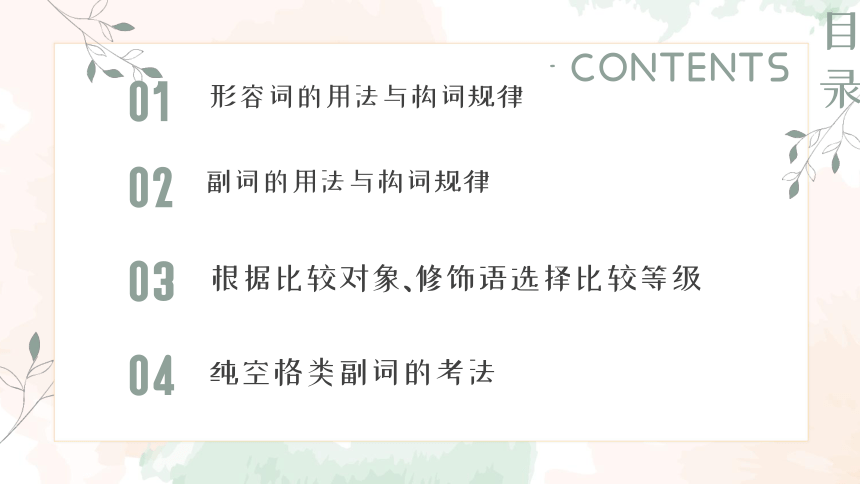

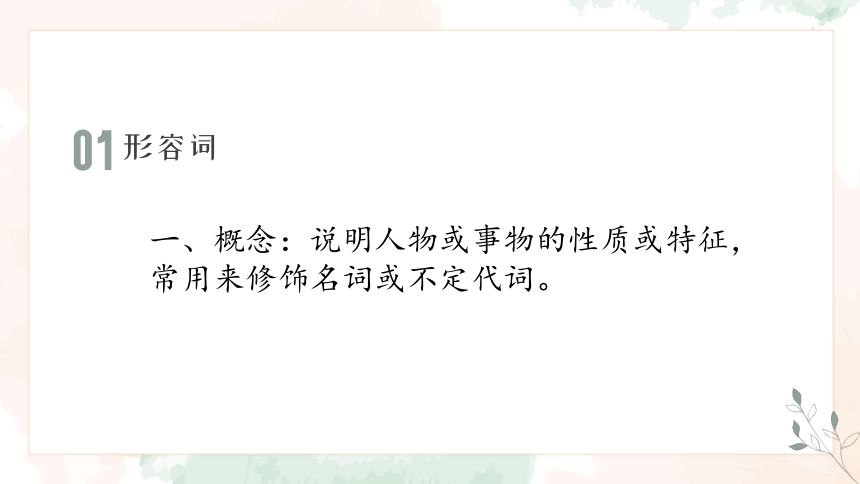
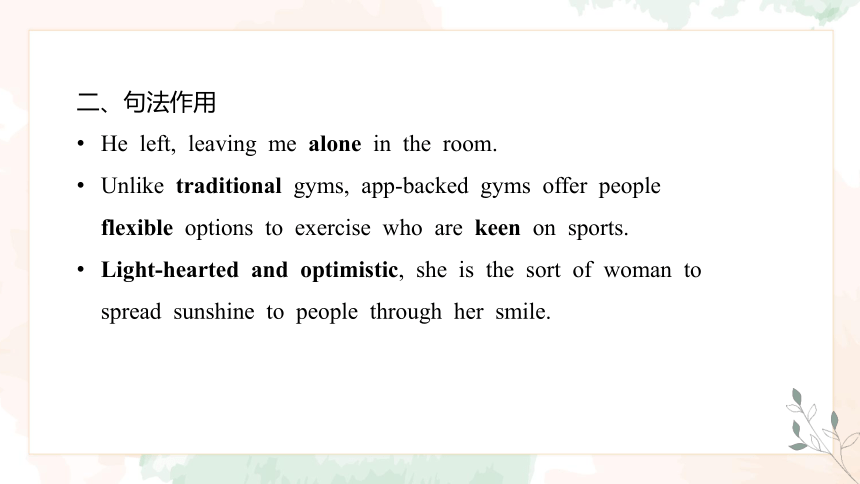
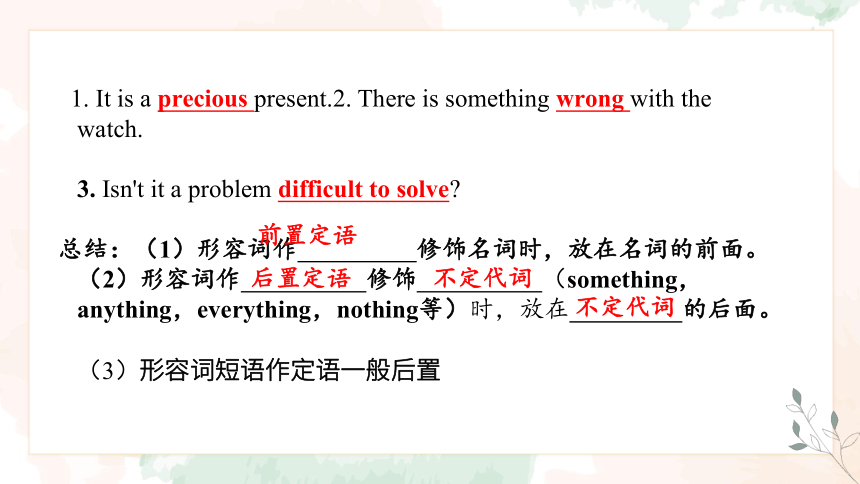
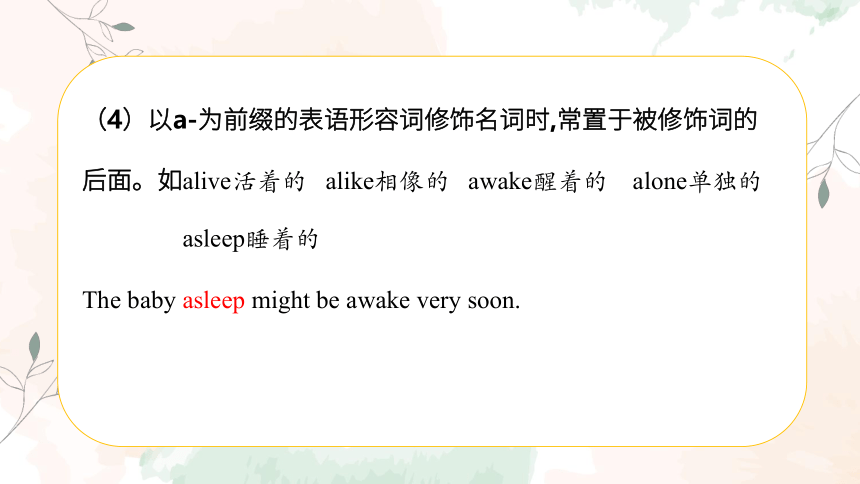

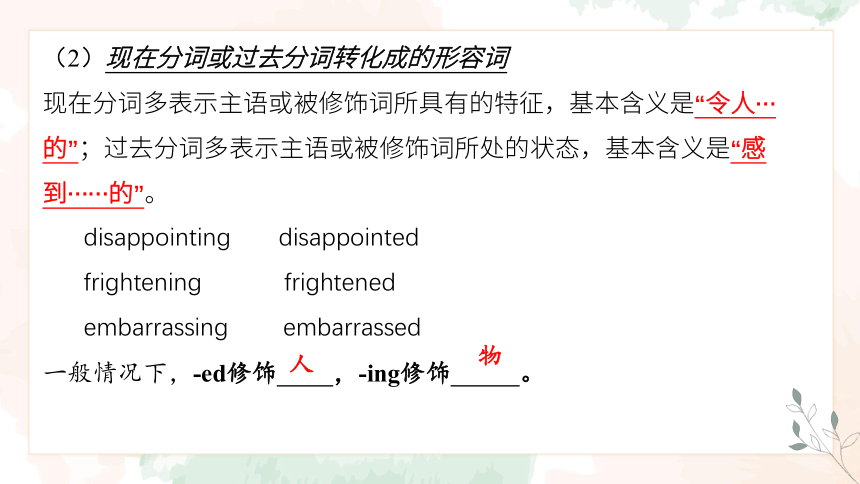
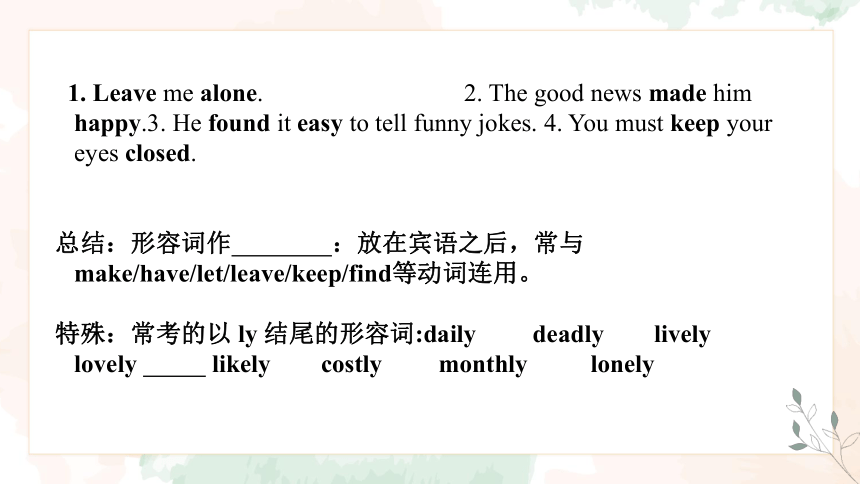
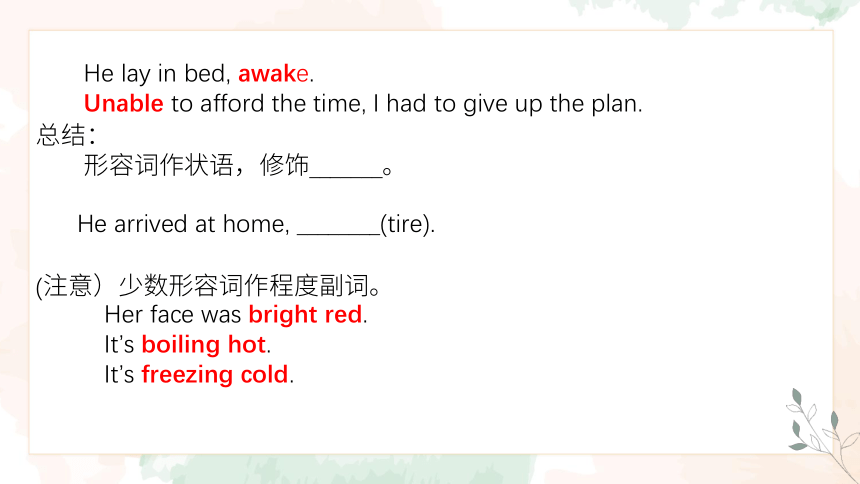
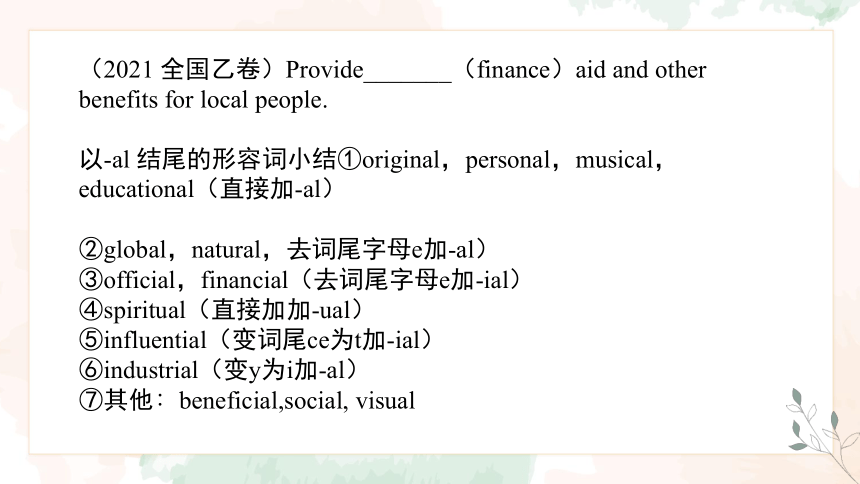
文档简介
(共32张PPT)
形容词&副词
adjectives&adverbs
语法复习
- CONTENTS
01
形容词的用法与构词规律
02
副词的用法与构词规律
03
根据比较对象、修饰语选择比较等级
04
纯空格类副词的考法
目录
形容词的用法与构词规律
第一部分
01
形容词
一、概念:说明人物或事物的性质或特征,常用来修饰名词或不定代词。
二、句法作用
He left, leaving me alone in the room.
Unlike traditional gyms, app-backed gyms offer people flexible options to exercise who are keen on sports.
Light-hearted and optimistic, she is the sort of woman to spread sunshine to people through her smile.
1. It is a precious present.2. There is something wrong with the watch.
3. Isn't it a problem difficult to solve
总结:(1)形容词作 修饰名词时,放在名词的前面。(2)形容词作 修饰 (something,anything,everything,nothing等)时,放在 的后面。
(3)形容词短语作定语一般后置
前置定语
后置定语
不定代词
不定代词
(4)以a-为前缀的表语形容词修饰名词时,常置于被修饰词的后面。如alive活着的 alike相像的 awake醒着的 alone单独的
asleep睡着的
The baby asleep might be awake very soon.
1. The leaves become red in autumn. 2. His words seem reasonable. 3. To keep healthy, we should eat more fruit and vegetables.4. The film was so moving that everyone was moved to tears.
总结:(1)形容词作 :放在 后。
常见系动词:(表示主语是什么/怎么样,不表具体动作)
状态系动词 :
感官系动词
保持系动词 :
变化系动词 :
表像系动词(看起来) :
表语
系动词
(2)现在分词或过去分词转化成的形容词
现在分词多表示主语或被修饰词所具有的特征,基本含义是“令人…的”;过去分词多表示主语或被修饰词所处的状态,基本含义是“感到……的”。
disappointing disappointed
frightening frightened
embarrassing embarrassed
一般情况下,-ed修饰 ,-ing修饰 。
人
物
1. Leave me alone. 2. The good news made him happy.3. He found it easy to tell funny jokes. 4. You must keep your eyes closed.
总结:形容词作 :放在宾语之后,常与make/have/let/leave/keep/find等动词连用。
特殊:常考的以 ly 结尾的形容词:daily deadly lively lovely likely costly monthly lonely
He lay in bed, awake.
Unable to afford the time, I had to give up the plan.
总结:
形容词作状语,修饰_______。
He arrived at home, ________(tire).
(注意)少数形容词作程度副词。
Her face was bright red.
It’s boiling hot.
It’s freezing cold.
(2021 全国乙卷)Provide_______(finance)aid and other benefits for local people.
以-al 结尾的形容词小结①original,personal,musical,educational(直接加-al)
②global,natural,去词尾字母e加-al)
③official,financial(去词尾字母e加-ial)
④spiritual(直接加加-ual)
⑤influential(变词尾ce为t加-ial)
⑥industrial(变y为i加-al)
⑦其他∶beneficial,social, visual
(2021·西安重点高中第十次模拟)There are many different sizes and styles of seals(印章)._______(expensive)small seals can be carved from wood or plastic while high-end seals are made from jade, marble or steel.
(1)常考的表示否定意义的形容词前缀∶①in∶
inadequate ,incredible
②il-∶
illegal,illogical
③im-∶
imperfect,impractical,
④ir-∶
irrelevant ,irresponsible, irregular
⑤un-∶
unfair,unfortunate,unusual,unforgettable
⑥dis∶
dishonest,disloyal
(2)常考的表示否定意义的形容词后缀∶-less∶
useless,careless ,homeless,hopeless,endless ,breathless,countless
-free:
care-free,tax-free,smoke-free,stress-free,salt-free
-proof:
water-proof,flame-proof
副词的用法与构词规律
第二部分
副词1. Please write slowly and carefully. (副词修饰 )2. Mary and Jane are quite different. (副词修饰 )3. He spoke too quickly to understand. (副词修饰 )4. He is badly in need of money. (副词修饰介词短语)5. Generally, it's a book worth reading. (副词修饰 )6. There are nearly 100 students on the playground.(副词修饰 )
总结:副词可以用来修饰: , , ,介词短语, , 。
副词一般表示时间、地点、方式、程度、动作、频率等,在句中主要作 。
though“ ”(用于句末)
meanwhile“ ”
therefore/thus/consequently“ ”
moreover/furthermore“ ”;
besides“另外,还有”;
however“然而”;
instead“ ”;
anyway/anyhow“ ”;
otherwise“ ”
1. 常考的连接副词:
2. 形副同形词 early, late, fast, enough
3. 同根副词,意义有别
hard – hardly near – nearly late--lately
二、形容词变副词的规律
1. 一般情况加-ly。如:entire→entirely; careful→carefully; quick→quickly;
2. 以“辅音字母+y”结尾的单词,变y为i再加-ly。如:angry→angrily; heavy→heavily;
3. 以-ble结尾的单词,将ble改为bly。如:probable→probably; comfortable→comfortably;
4. 以“元音字母+e”结尾的单词,去掉e再加-ly。如:true→truly;
5. 以-ic结尾的,加-ally。如:basic→basically; energetic→energetically。
whole---_________ shy--- _________ good---_________
adv. adv. adv.
以ly 结尾的表抽象意义,与形容词同形的表具体意义。
close—closely wide—widely
high—highly deep—deeply
根据比较对象、修饰语
选择比较等级
第三部分
不规则变化 原级 比较级 最高级
good/well ____________ _______
bad/ill _______ _______
many/much _______ _______
old _______ _______
little _______ _______
far _______(具体) _______(具体)
_______(具体或抽象) _______(具体或抽象)
规则变化 词形分类及变化构成 原级 比较级 最高级
单音节词和少数双音节词 一般加-er或-est long longer longest
以-e结尾,只加-r或-st fine finer finest
以重读闭音节结尾且末尾只有一个辅音字母,先双写该辅音字母再加-er 或-est big hot fat bigger hotter fatter biggest
hottest
fattest
以辅音字母+y结尾,先变y为i再加-er或-est happy easy happier easier happiest
easiest
其他双音节词和多音节词 在词前加more或most less或least difficult more difficult most
difficult
beautiful less beautiful least
beautiful
由形容词加ly构成的双音节词和多音节词都是在该词前-more/most. quickly more quickly most quickly
(一)平级比较 as … as …身体健康和精神健康一样重要。 _________________________________
当as...as...结构中有名词时,可用以下结构:
①as+形容词原级+a(n)+可数名词单数+as... ②as+many+可数名词复数+as... ③as+much+不可数名词+as...
我从来没有像今天这样累过。_________________________________
我拥有的书和他一样多。 _________________________________
比较级 ①“形容词比较级+than...”表示“两者中一方比另一方更……” 。 ②“less+形容词原级+than...”表示“一方不及另一方……” The problem is more important than that one.
I am less fortunate than him.
特别提醒:修饰比较级的常用词和短语主要有much, even, still, far, a little, a lot, rather 等。more, very等副词不可修饰比较级
She's even/far/ much more intelligent than her sister.
你看起来比他年轻多了。__________________________
含有比较等级的特殊用法 ①“the+比较级...,the+比较级...” “越……,(就)越……”
越努力越幸运。________________________
②“比较级+and+比较级”“越来越……”
中国变得越来越强大。_________________________________
③“the+比较级+of the two+名词复数”“两者中较……的那个”
④no more than There is room for no more than three cars.
not more than This main avenue was not more than eight or
ten feet wide.
⑤more...than... He is more brave than clever.
⑥no+比较级+than This machine is no better than that one.
⑦not+比较级+than He is not more diligent than you.
最高级 最高级的常见用法 ①“the+最高级+表示比较范围的短语或从句”,表示“……中最……的” ②one of+the+形容词最高级+名词复数 ③the+序数词+形容词最高级+名词 Andy is content with the toy. It is the best he has ever got.
Shanghai is one of the biggest cities in our country.
Africa is the second largest continent in the world.
最高级 最高级的其他表达 ①否定词+比较级 ②比较级+than+any other+单数可数名词 ③比较级+than+the other+复数可数名词 ④比较级+than+any of the other+复数可数名词 ⑤比较级+than anything/anyone else You can’t be more careful when crossing the road.
Your story is perfect; I’ve never heard a better one before.
The Yangtze River is longer than any other river/than the other rivers/than any of the other rivers in China.
纯空格类副词的考法
第四部分
高考对纯空格类副词的考查,一般涉及∶
(1)意义相近的词,如业such,before/ago等,要注意其搭配和用法;
(2)连接性副词,如besides/therefore/instead/ anyhow/rather等,要依据词义和逻辑关系进行区分。
The diet and the way of life are often a problem for teenagers. ______,the good news is that you can feel better, look better and have more energy if you eat the right food and exercise regularly.
Looking at her smiling face,I felt______happy that I gave her a new storybook.
形容词&副词
adjectives&adverbs
语法复习
- CONTENTS
01
形容词的用法与构词规律
02
副词的用法与构词规律
03
根据比较对象、修饰语选择比较等级
04
纯空格类副词的考法
目录
形容词的用法与构词规律
第一部分
01
形容词
一、概念:说明人物或事物的性质或特征,常用来修饰名词或不定代词。
二、句法作用
He left, leaving me alone in the room.
Unlike traditional gyms, app-backed gyms offer people flexible options to exercise who are keen on sports.
Light-hearted and optimistic, she is the sort of woman to spread sunshine to people through her smile.
1. It is a precious present.2. There is something wrong with the watch.
3. Isn't it a problem difficult to solve
总结:(1)形容词作 修饰名词时,放在名词的前面。(2)形容词作 修饰 (something,anything,everything,nothing等)时,放在 的后面。
(3)形容词短语作定语一般后置
前置定语
后置定语
不定代词
不定代词
(4)以a-为前缀的表语形容词修饰名词时,常置于被修饰词的后面。如alive活着的 alike相像的 awake醒着的 alone单独的
asleep睡着的
The baby asleep might be awake very soon.
1. The leaves become red in autumn. 2. His words seem reasonable. 3. To keep healthy, we should eat more fruit and vegetables.4. The film was so moving that everyone was moved to tears.
总结:(1)形容词作 :放在 后。
常见系动词:(表示主语是什么/怎么样,不表具体动作)
状态系动词 :
感官系动词
保持系动词 :
变化系动词 :
表像系动词(看起来) :
表语
系动词
(2)现在分词或过去分词转化成的形容词
现在分词多表示主语或被修饰词所具有的特征,基本含义是“令人…的”;过去分词多表示主语或被修饰词所处的状态,基本含义是“感到……的”。
disappointing disappointed
frightening frightened
embarrassing embarrassed
一般情况下,-ed修饰 ,-ing修饰 。
人
物
1. Leave me alone. 2. The good news made him happy.3. He found it easy to tell funny jokes. 4. You must keep your eyes closed.
总结:形容词作 :放在宾语之后,常与make/have/let/leave/keep/find等动词连用。
特殊:常考的以 ly 结尾的形容词:daily deadly lively lovely likely costly monthly lonely
He lay in bed, awake.
Unable to afford the time, I had to give up the plan.
总结:
形容词作状语,修饰_______。
He arrived at home, ________(tire).
(注意)少数形容词作程度副词。
Her face was bright red.
It’s boiling hot.
It’s freezing cold.
(2021 全国乙卷)Provide_______(finance)aid and other benefits for local people.
以-al 结尾的形容词小结①original,personal,musical,educational(直接加-al)
②global,natural,去词尾字母e加-al)
③official,financial(去词尾字母e加-ial)
④spiritual(直接加加-ual)
⑤influential(变词尾ce为t加-ial)
⑥industrial(变y为i加-al)
⑦其他∶beneficial,social, visual
(2021·西安重点高中第十次模拟)There are many different sizes and styles of seals(印章)._______(expensive)small seals can be carved from wood or plastic while high-end seals are made from jade, marble or steel.
(1)常考的表示否定意义的形容词前缀∶①in∶
inadequate ,incredible
②il-∶
illegal,illogical
③im-∶
imperfect,impractical,
④ir-∶
irrelevant ,irresponsible, irregular
⑤un-∶
unfair,unfortunate,unusual,unforgettable
⑥dis∶
dishonest,disloyal
(2)常考的表示否定意义的形容词后缀∶-less∶
useless,careless ,homeless,hopeless,endless ,breathless,countless
-free:
care-free,tax-free,smoke-free,stress-free,salt-free
-proof:
water-proof,flame-proof
副词的用法与构词规律
第二部分
副词1. Please write slowly and carefully. (副词修饰 )2. Mary and Jane are quite different. (副词修饰 )3. He spoke too quickly to understand. (副词修饰 )4. He is badly in need of money. (副词修饰介词短语)5. Generally, it's a book worth reading. (副词修饰 )6. There are nearly 100 students on the playground.(副词修饰 )
总结:副词可以用来修饰: , , ,介词短语, , 。
副词一般表示时间、地点、方式、程度、动作、频率等,在句中主要作 。
though“ ”(用于句末)
meanwhile“ ”
therefore/thus/consequently“ ”
moreover/furthermore“ ”;
besides“另外,还有”;
however“然而”;
instead“ ”;
anyway/anyhow“ ”;
otherwise“ ”
1. 常考的连接副词:
2. 形副同形词 early, late, fast, enough
3. 同根副词,意义有别
hard – hardly near – nearly late--lately
二、形容词变副词的规律
1. 一般情况加-ly。如:entire→entirely; careful→carefully; quick→quickly;
2. 以“辅音字母+y”结尾的单词,变y为i再加-ly。如:angry→angrily; heavy→heavily;
3. 以-ble结尾的单词,将ble改为bly。如:probable→probably; comfortable→comfortably;
4. 以“元音字母+e”结尾的单词,去掉e再加-ly。如:true→truly;
5. 以-ic结尾的,加-ally。如:basic→basically; energetic→energetically。
whole---_________ shy--- _________ good---_________
adv. adv. adv.
以ly 结尾的表抽象意义,与形容词同形的表具体意义。
close—closely wide—widely
high—highly deep—deeply
根据比较对象、修饰语
选择比较等级
第三部分
不规则变化 原级 比较级 最高级
good/well ____________ _______
bad/ill _______ _______
many/much _______ _______
old _______ _______
little _______ _______
far _______(具体) _______(具体)
_______(具体或抽象) _______(具体或抽象)
规则变化 词形分类及变化构成 原级 比较级 最高级
单音节词和少数双音节词 一般加-er或-est long longer longest
以-e结尾,只加-r或-st fine finer finest
以重读闭音节结尾且末尾只有一个辅音字母,先双写该辅音字母再加-er 或-est big hot fat bigger hotter fatter biggest
hottest
fattest
以辅音字母+y结尾,先变y为i再加-er或-est happy easy happier easier happiest
easiest
其他双音节词和多音节词 在词前加more或most less或least difficult more difficult most
difficult
beautiful less beautiful least
beautiful
由形容词加ly构成的双音节词和多音节词都是在该词前-more/most. quickly more quickly most quickly
(一)平级比较 as … as …身体健康和精神健康一样重要。 _________________________________
当as...as...结构中有名词时,可用以下结构:
①as+形容词原级+a(n)+可数名词单数+as... ②as+many+可数名词复数+as... ③as+much+不可数名词+as...
我从来没有像今天这样累过。_________________________________
我拥有的书和他一样多。 _________________________________
比较级 ①“形容词比较级+than...”表示“两者中一方比另一方更……” 。 ②“less+形容词原级+than...”表示“一方不及另一方……” The problem is more important than that one.
I am less fortunate than him.
特别提醒:修饰比较级的常用词和短语主要有much, even, still, far, a little, a lot, rather 等。more, very等副词不可修饰比较级
She's even/far/ much more intelligent than her sister.
你看起来比他年轻多了。__________________________
含有比较等级的特殊用法 ①“the+比较级...,the+比较级...” “越……,(就)越……”
越努力越幸运。________________________
②“比较级+and+比较级”“越来越……”
中国变得越来越强大。_________________________________
③“the+比较级+of the two+名词复数”“两者中较……的那个”
④no more than There is room for no more than three cars.
not more than This main avenue was not more than eight or
ten feet wide.
⑤more...than... He is more brave than clever.
⑥no+比较级+than This machine is no better than that one.
⑦not+比较级+than He is not more diligent than you.
最高级 最高级的常见用法 ①“the+最高级+表示比较范围的短语或从句”,表示“……中最……的” ②one of+the+形容词最高级+名词复数 ③the+序数词+形容词最高级+名词 Andy is content with the toy. It is the best he has ever got.
Shanghai is one of the biggest cities in our country.
Africa is the second largest continent in the world.
最高级 最高级的其他表达 ①否定词+比较级 ②比较级+than+any other+单数可数名词 ③比较级+than+the other+复数可数名词 ④比较级+than+any of the other+复数可数名词 ⑤比较级+than anything/anyone else You can’t be more careful when crossing the road.
Your story is perfect; I’ve never heard a better one before.
The Yangtze River is longer than any other river/than the other rivers/than any of the other rivers in China.
纯空格类副词的考法
第四部分
高考对纯空格类副词的考查,一般涉及∶
(1)意义相近的词,如业such,before/ago等,要注意其搭配和用法;
(2)连接性副词,如besides/therefore/instead/ anyhow/rather等,要依据词义和逻辑关系进行区分。
The diet and the way of life are often a problem for teenagers. ______,the good news is that you can feel better, look better and have more energy if you eat the right food and exercise regularly.
Looking at her smiling face,I felt______happy that I gave her a new storybook.
